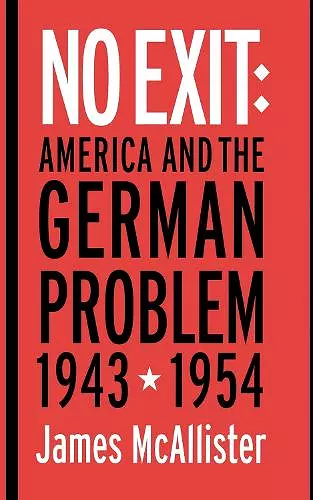No Exit
America and the German Problem, 1943–1954
Format:Hardback
Publisher:Cornell University Press
Published:17th Dec '01
Currently unavailable, and unfortunately no date known when it will be back

James McAllister outlines a new account of early Cold War history, one that focuses on the emergence of a bipolar structure of power, the continuing importance of the German question, and American efforts to create a united Western Europe. Challenging the conventional wisdom among both international relations theorists and Cold War historians, McAllister argues that America's central objective from the Second World War to the mid-1950s was to create a European order that could be peaceful and stable without requiring the permanent presence of American ground forces on the continent.
The permanent presence of American forces in Europe is often seen as a lesson that policymakers drew from the disastrous experiences of two world wars, but McAllister's archival research reveals that both FDR and Eisenhower, as well as influential strategists such as George Kennan, did not draw this lesson. In the short term, American power was necessary to balance the Soviet Union and reassure Western Europe about the revival of German power, but America's long-term objective was to create the conditions under which Western Europe could take care of both of these problems on their own. In the author's view, the key element of this strategy was the creation of the European Defense Community. If Western Germany could be successfully integrated and rearmed within the context of the EDC, Western Europe would have taken the most important step to becoming a superpower on par with the United States and the Soviet Union. Understanding why this strategy was pursued and why it failed, McAllister asserts, has important implications for both international relations theory and contemporary questions of American foreign policy.
James McAllister's book examines why..., despite every original intention, the United States never found a suitable exit strategy from the military commitment to Western Europe.... It tackles an important question with persuasive reasoning and with a useful narrative informed by solid archival research.
* Register of the Kentucky Historical Society *McAllister sets out to prove that the U.S. wanted to shape a post-WWII European power structure that could maintain peace without US military forces.... He argues repeatedly that the U.S. had no desire for an empire; Americans simply wanted to go home. But the telling point comes when the author suggests that the U.S. had an 'Empire by Default.'.
* Choice *This is a lively and well-written account of what is too often a deadly dull topic that appeals only to masochistic cognoscenti. Because it asks questions that diplomatic historians ought to be asking, it is much to be welcomed.
* International History ReviISBN: 9780801438769
Dimensions: 235mm x 155mm x 24mm
Weight: 907g
296 pages